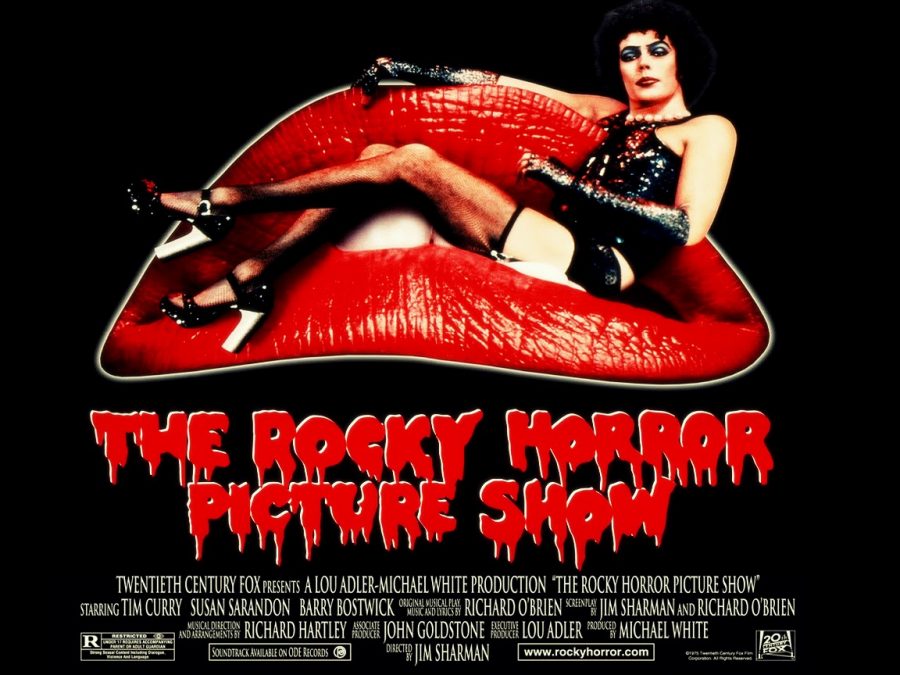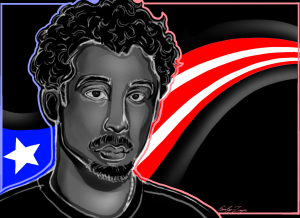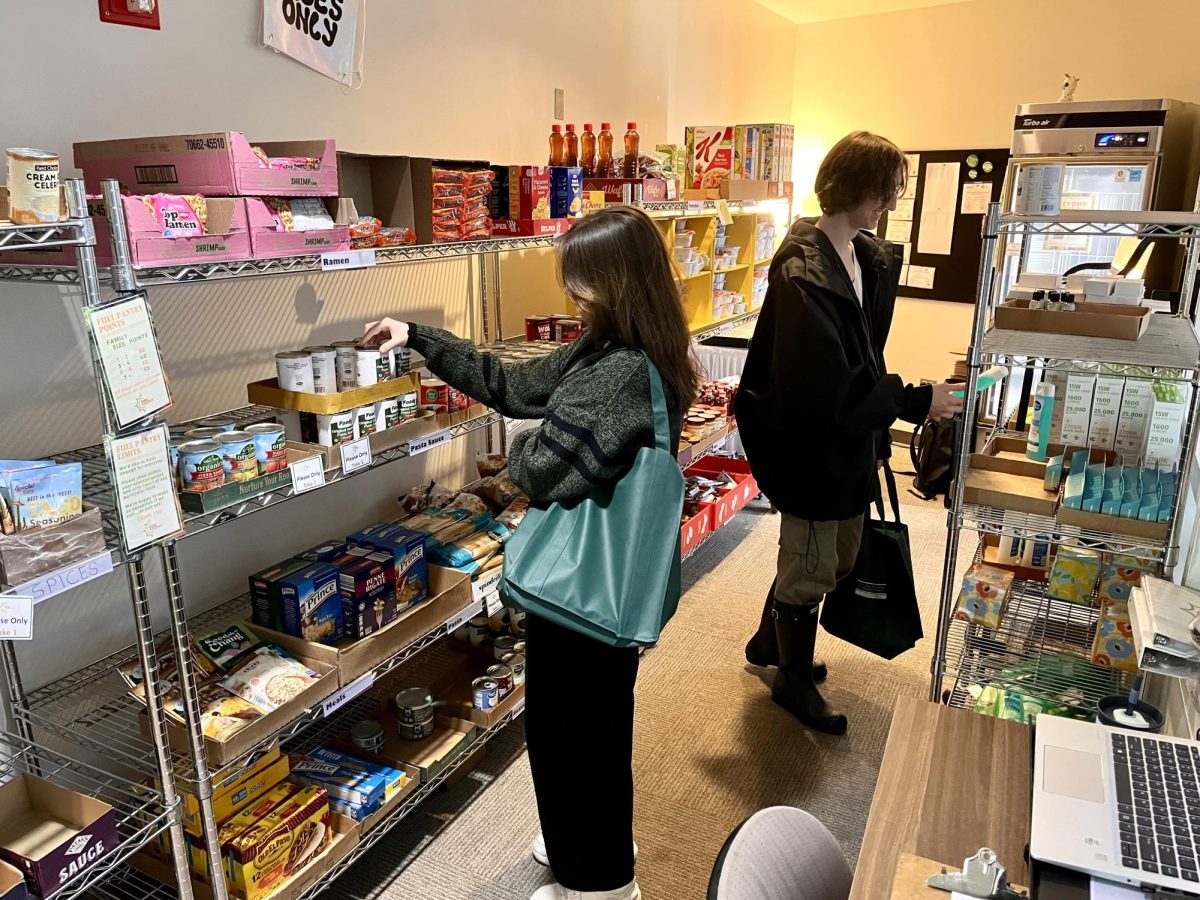The Rocky Horror Picture Show vs. Trump’s America
Salacious lyrics like, “I’ve been making a man. With blonde hair and a tan. And he’s good for relieving my….tension,” have helped Rocky Horror endure
October 24, 2018
“I’m just a sweet transvestite, from Transsexual, Transylvania.”
Life is too short to be straight.
And in the age of President Donald Trump and Attorney General Jeff Sessions, life is too long to live by the prejudice and discriminations of a parochial, past generation.
If “The Rocky Horror Picture Show” has any relevance today, it’s in combatting the hateful LGBTQ stereotypes perpetuated by a resurgent, evangelical right. At a time when conservative social norms and religious freedoms are held in higher regard than protections and equality for the gay community, a pair of sultry, red lips and fishnet stockings are once again taking to the silver screen.
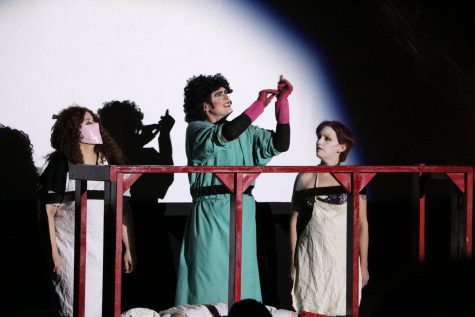
Few cultural events have done more to bring people together while dismantling the closeted shame of being gay than Rocky Horror.
Michael Moon, head theater designer at College of DuPage, remembered having so much fun the first time he saw the show in the early ‘80s, he went back several times. The audience represented a counterculture rebelling against the conservative social norms dominant in society.
“Judging people without knowing them was so prevalent at the time. Judging because what they look like or how they behaved. In a situation like Rocky Horror, everyone is the same. All different types of people are there to have a good time. It didn’t matter what you looked like or who you were, we were all going to throw popcorn, have our newspapers, and shout out the same words at the screen.”
Rocky Horror tells the tale of Dr. Frank N. Furter, an androgynous alien tempting humans into a hedonistic lifestyle with his siren call to, “give yourself over to absolute pleasure.”
The musical, science-fiction-comedy-horror film flopped upon release in 1975. It amassed a cult following as a midnight movie when the audience began yelling out comedic responses at the film. Fans soon began dressing up as the glam-inspired characters and acting out the film with a shadow cast in front of the screen. Over the years, fans began to participate with the film by throwing toast, toilet paper, water, rice and cards, dancing the choreographed Time Warp and holding newspapers over their heads at moments timed with the film.
The film’s message of acceptance and sexual liberation integrated the oddities, social rejects and misfits of an unwelcoming society into a crowd of conservatively deemed normal people. The film mocked the era’s forbidden sexual taboos and allowed the ostracized freaks and sexual deviants a chance to step out of their closeted shadows and into the spotlight.
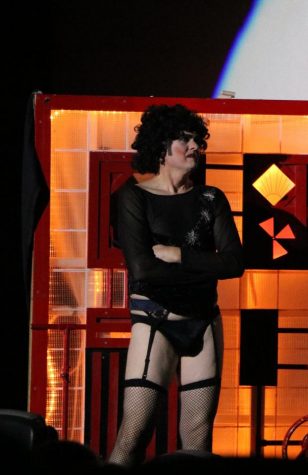
Kim Morris, director of the school’s Theater Costumes, said there was no other show quite like it.
“Every element is so much fun, over the top and ridiculous. With the cross-dressing and horror and sci-fi features, it explores multiple sexualities and oddities finding acceptance and their own community. It’s entertainment, but its’ message creeps in subconsciously of being able to enjoy yourself no matter who you are, or the type of people you are surrounded by.”
Rocky Horror catalyzed a societal evolution in gender fluidity. Celebrating sexuality through flamboyance and pomp, it paralleled its cross-dressing antihero with the cool rock n’ roll idolatry of androgynous figures David Bowie, Freddie Mercury and Mick Jagger. When contrasted with the prim and proper tendencies of protagonists Brad and Janet, the alien man in the bustier corset loves to “see you shiver with antici……..pation.”
Satirical, self-aware and unassuming, you must take Rocky Horror’s political subversions with a grain of glitter. Less shocking today, the film represents how dramatically our culture’s toleration of sexual divergence has shifted over the decades.
Moon believes the film’s endurance is a testament to the strength in each character’s pride in their identities.
“Today we don’t have enough of being comfortable and accepting who you truly are. You can’t let what other people think of you make a difference in the way you live your life.”
Moon acknowledged current societal regressions in the momentum the LGBTQ community has made.
“We need to actively combat the provincial attitude trying to dictate sexual and societal norms. We were making great progress and people were feeling free to be whoever they wanted. Now, it appears you might again have to hide who you truly are. Nobody should ever feel afraid or intimidated. As the film says, don’t dream it, be it.”
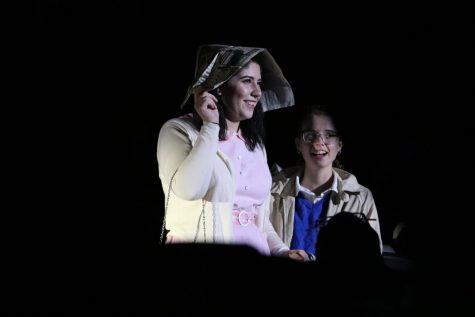
Lyrics dripping with sexual innuendo include Janet euphorically sing/moaning, “I thought there’s no use getting. Into heavy petting. It only leads to trouble. And seat wetting.”…”Touch me…I wanna be dirty”
Once representing a harbor where the gay community could congregate and celebrate their identities, today Rocky Horror has become a relic. If my recent excursion to Hollywood Blvd in Woodridge, IL, is any indication, midnight shows have become gentrified by an inundation of straight people wearing street clothing. At a time when sexual rebellion is needed most, political subversion has been undermined by the audience’s jocularity and passivity.
This tendency to trivialize the importance of identity and self-appreciation has evolved into the conservative culture increasingly encroaching upon rights of the gay individual.
Dr. Frank N. Furter’s cocky drawl and sumptuous flamboyance are vacant in today’s struggle for acceptance.
COD’s Pride Alliance member Isabella Davison Ararcio fears social conservatism creeping back into the mainstream conscious.
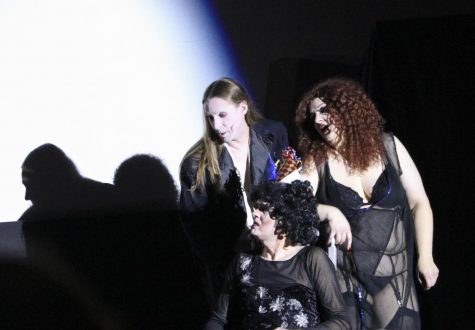
The narrator issues a dire warning about humanity losing touch with liberation and hedonism. “And crawling on the planet’s face. Some insects called the human race. Lost in time, and lost in space. And meaning.” Pictured, Benjamin Crawford as Riff Raff and Ruth Fink-Winter as Magenta
“(Frank N. Furter’s) confidence was a great example people can follow when coming out to their friends or family. In Trump’s America, when you’re out in public, you need this confidence to be willing to hold your ground.”
Member Jun Tucker added, “Education is the most important thing for the LGBTQ community. Because of a lack of awareness, I didn’t come to the realization I was trans until after I should (have). I suffered a lot because of that. Because people around me weren’t educated, they also were slower to accept me for who I am.”
Ararcio believes there needs to be places where the LGBTQ community can congregate and discover their true identities free from fear or societal pressures. She highlighted the importance of experienced members of the community going out with outreach to help individuals struggling with their identity.
“I’ve become comfortable with who I am, so if somebody who is conservative confronts me, I can hold my ground. But somebody who has just come out, or is struggling to come out, this experience can be more painful.”
Member Kevin Ashley believes in the importance of listening to opposing viewpoints.
“We need to try and understand the other side and explain, how can you hate me if you don’t know me? Talk to conservatives and see what you can learn to better combat their hurtful viewpoints.”
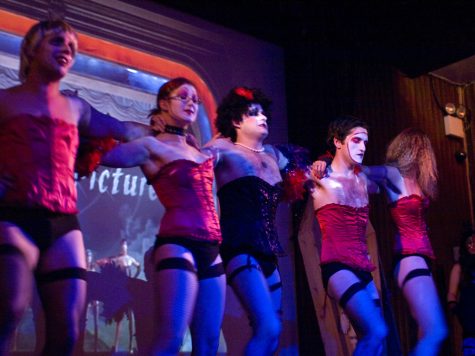
Member Sean Suiba added, “When you go to a live show, you see all different types of people, especially the types you wouldn’t expect. You see macho men in fishnet stockings, young and old; it has a magic way of uniting people. It teaches don’t be afraid to explore and be yourself. No matter who you are, there is a family for you. This is why the show is still needed today, this message is always important.”
Embodying this message, actress Susan Sarandon sings early in the film, “There’s a guiding star no matter what or who you are. There’s a light in the darkness of everybody’s life.”
Ararcio believes you are who you are, and no corrective measures can change that or take it away from you.
Member K. Riley said, “Come as you are and be proud. People will love you, and if somebody doesn’t like you, or is unwilling to accept you, that’s their loss.
“As someone who is the outlier of my conservative family, it’s OK to be different. There’s always going to be somebody who says you are wrong, but there’s also always going to be someone who is on your side. You can find the help you need in the most unlikely places.”
When the show is done right, it challenges one to question their judgments and inhibitions. Submersed in a foreign lifestyle of deviance, the film corrodes xenophobic tendencies to instinctively fear and discriminate against people who are different than you.
“If you were raised in a strict household and find Rocky Horror upsetting, you still need to watch it,” said Moon. “You need to see these people are just like you. It doesn’t matter if they are wearing fishnet stockings, or not, there is no difference. Whether you are a part of the culture, or outside, you realize the characters just want to be loved like everyone else does.”
Moon let his son watch the film when he was 10 years old. He believes acceptance begins early in development and everyone should be aware of just how diverse and wonderful our society is.
Suiba explained the reluctance by some to embrace the film and the message it conveys.
“My dad is somebody who is against the movie and has never seen it. But, I know if he ever did, especially one of the live shows, he would love it. People often make up their minds before they even try anything. Don’t be afraid to ever try something.”
Ararcio preached the proactive effort needed to combat the current societal regression in LGBTQ equality.
“In order to grow as a person, you have to move into new areas. If you never move out of your comfort zone, you are going to stagnate and nothing with you will ever change.”



